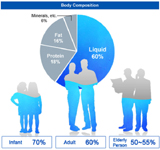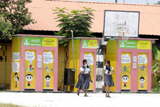Nutrition and diet
Adequate hydration — a key to health
Abstract
Water intake is a most crucial activity in maintaining health. One should drink water at the right time, right pace and right temperature. Drink enough water long before eating solid food, at a slow pace and with the water at around body temperature. Always drink safe, contamination-free water. Proper hydration gives enhanced capability of acclimatisation. The authors draw upon their clinical experience to validate these conclusions.
Water consumption is an important aspect for healthy living practices. One should know when to drink, how much to drink and how to drink. Very few of us are aware of this. The heat in India bothers everyone for almost 8 months of the year, the months of April and May being peak summer, when sometimes the mercury touches 47° Celsius mark. Drinking water in adequate quantity then is essential.
In my clinical practice of the last 38 years I have come across innumerable patients who have suffered due to improper fluid intake. I remember a female patient of 62 years of age who complained of stinking sweat. We tried many medicines on the basis of symptom similarity but with no results. On further enquiry, we realised that she hardly drank water as she was busy with indoor office work. I advised her to drink plenty of water half an hour before each meal. Initially, she started sweating more but without any stink or strong odour! Drinking water in the proper pattern promptly cured her.
I should quote one interesting case. We have a very popular primary school in our residential area. The school has a large number of students. Owing to paucity of space, the school operates in two shifts. The first shift has students in the age group of 7 to 9 years who study from 7.15 am till 12.00 noon. The second shift is from 12.30 pm to 5.00 pm. Each shift has around 1,200 students.
The urinals at the school used to emit a horrible smell. The management used to reprimand the cleaning staff for not cleaning the urinals properly. Repeated flushing also was not effective. The exhaust-fan used to transfer the smell outside the school. The management went to the extent of reviewing the design of the toilet block as they thought that might be the problem.
On studying the dynamics of the school, we advised them to regularise the water-intake of the school children. We counselled the parents to ask their children to drink more water or fluids in any form before coming to school. The children used to eat snacks or mini meals during recess. The teachers also prompted the children to drink more water half an hour before recess. After one week of this practice, the strong odour from the toilets stopped. The children too were much more comfortable as they had no bladder irritability. This pattern of drinking water before food resolved the issue swiftly.
I have come across numerous cases of Urinary Tract Infections (UTI). These subjects often develop recurrent episodes of UTI. Each time a heavy dose of antibiotics gives just temporary relief. Many of them enter into a vicious circle. As they start urinating frequently, they tend to restrict fluid-intake under the wrong impression that the intake of more water would cause further frequency of urination. The recurrent inflamed bladder mucosa causes irritation even with little urine but giving rise to the urgency to urinate. People with such a condition (chronic cystitis) need to pass urine 4 to 5 times every night. Such a person needs to drink lots of water in the proper pattern for months to resolve thickening of the bladder mucosa caused by chronic inflammation. We need to counsel the person to understand that the frequency is due more to irritation of the bladder and not because of excessive urine secretion. In clinical practice, you get equal number of cases of UTI in summer and winter. The reason is poor intake of water. In winter humidity is low and sweat gets dried instantly.
There is a myth among one sect of Āyurvedic physicians that drinking water on an empty stomach is poisonous! Maybe there is a genuine reason behind the genesis of such a myth. In human physiology, when one eats a solid meal the food gets churned up in an hour or two by tight closure of the pyloric end of the stomach. The hydrochloric acid secreted in the stomach has a disinfectant action along with the digestive process. However this emptying time for plain water on an empty stomach is almost zero. In case drinking water contains any harmful germs they would easily pass on further, directly into the small intestines. This is the reason we advise everyone to drink safe water (preferably of body temperature) free from possible contaminations.
People have witnessed sporadic cases of so-called water intoxication being fatal. Such incidences occur after heavy physical activity like athletics. When an athlete after extreme dehydration gulps water fast, the system goes into a shock-like crisis which can sometimes turn fatal. Under such an utter dehydration state, one should drink body temperature water sip by sip till one is moderately hydrated.
Sweating is a physiological coolant for the human body during the hot season. During a hot summer, it is essential to keep yourself well hydrated. In case you are not hydrated properly, the body cannot invest fluid for sweating. Hence you start experiencing heat. Good hydration ensures enough scope for sweating and thereby cooling your body. I have seen people, who complaining of heat, drink plain water in large quantities then slowly start sweating freely. This sweating instantly relieves their hot feeling. However, exposure to sudden contrast (cold to hot and hot to cold) is harmful. For example, if you are in an air-conditioned area and are about to go out in the sun, you should first be in a non-air-conditioned area for 10–15 minutes, get acclimatised and then go out.
The same should be followed while entering an air-conditioned area. Keep the temperature of the air-conditioner above 25°C. When you are well hydrated you get acclimatised easily. I remember a patient of mine who used to get recurrent bleeding from her nose in summer and winter. She used to get painful dry scabs in her nostril, culminating into bleeding. She was in the habit of drinking chilled water during all seasons. We advised her to drink plain water first in sufficient quantity and then, if needed, take chilled water. When we ensured adequate intake of water, she stopped getting dry scabs in the nose and subsequently she never had bleeding from the nose. There are many instances of getting cracked lips, cracks in palms and soles. Most cases will be alleviated by adequate intake of water.
Even while travelling you should take care that you are well hydrated. If you are travelling in an AC car, you should switch on the AC only after you have started on your journey. In the same manner, a little before coming out of your AC car, you should switch off the AC and then disembark from your vehicle. Avoid over-exertion when it is very hot. Rather keep your pace of work low so that you stay cool.
Important tips on water consumption for everyone
It is important to drink a lot of water — plain water — not chilled. Drink it slowly, sip by sip. Avoid gulping it while walking or talking. If you are very fond of having chilled water, then you should persist with plain water and only switch to chilled water when a sufficient amount of plain water is drunk.
Always make it a point to drink a lot of plain water 30 minutes before your main meals (breakfast, lunch, and dinner). Drinking water before light snacks is also a good habit. If you happen to eat without hydrating yourself, your body is deprived of fluid for almost 2 hours till the stomach starts emptying. During the Indian summer, on an average one should consume 750–1000 ml plain water half an hour before one’s meal. In winter, 500 ml would suffice.
Eating heavy meals leads to prolonged churning of food in the stomach, which in turn leads to exertion and delayed emptying. This leads to dehydration for a while and discomfort. Hence, eat food that is light and easy to digest. Avoid eating fried foods.
Having an early dinner and sleeping early helps in building up your abilities to cope with summer.
On an empty stomach, the emptying time for plain water is negligible. Within a few minutes, the fluid advances further and is absorbed in the system. The sign that you are well hydrated is crystal-clear copious urine. Sweating helps maintain coolness in the body.
When we eat solid food, the pyloric end is shut and the digestive system starts working. Nothing is allowed to pass further until it is thoroughly churned. Hydrochloric acid secreted in the stomach helps in digestion and coagulation and works as a disinfectant as well. Hence, if you happen to drink contaminated water after a meal, it does not allow infections to thrive.
However, if you drink contaminated water on an empty stomach, there are chances that you can easily catch gastrointestinal tract infections.
Avoid over-exertion when it is very hot. Rather keep your pace of work marginally lower so that you stay cool.
Signs of dehydration
1. Cracks in nostrils, scab formation, occasionally leading to a bleeding nose on removal of such scabs.
2. Cracked soles and palms
3. Hard stools
4. No sweating and dry heat felt all over
5. Yellow, concentrated scanty urine, urinary tract infections
6. Headache
Dr. Uttareshwar Pachegaonkar and Dr. Arati Sharma are both Directors at the Sri Aurobindo Centre for Homoeopathy, Sri Aurobindo Society at Pondicherry.
Share with us (Comments,contributions,opinions)
When reproducing this feature, please credit NAMAH,and give the byline. Please send us cuttings.





